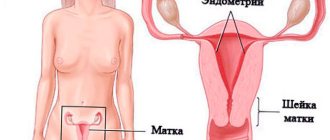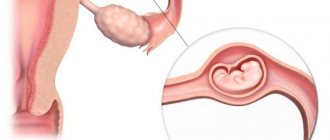The modern woman strives to be able to do everything and understand everything. Takes on household chores and earning money. At the same time, he completely forgets about his health and does not monitor his diet. There is simply not enough time for all this. But giving birth to a child is the main function of a woman. Under the influence of unfavorable external and internal factors, long-awaited pregnancies are increasingly ending in miscarriage. In addition to psychological trauma and constant torment, physical health problems are added. I want to make the second attempt as quickly as possible. At the same time, one important question is of interest: “When will menstruation be restored after a miscarriage, what should they be like?”
Periods after first miscarriage
The peculiarity of menstruation speaks about the health and readiness of the female body for conception. It is difficult to predict when ovulation will occur. Theoretically, it happens like this: the moment of miscarriage is considered the beginning of egg maturation, after 14-16 days ovulation occurs. The nature of menstruation depends on the duration of the monthly cycle before pregnancy and the duration of menstruation. Normally, the duration of menstruation after a miscarriage is no more than 7 days. On average, critical days appear 26-35 days after a miscarriage. This does not mean that a woman will be able to get pregnant again in the same month. Complete normalization of the female body, the cycle as a whole, depends on many factors:
- the period of pregnancy when the miscarriage occurred;
- whether additional cleaning of the uterus was carried out or not;
- the reasons for the miscarriage;
- the state of the female body as a whole;
- duration of hormonal treatment.
Miscarriage is considered early before 12 weeks of pregnancy. There are no particular adverse consequences for the physical female body. Significant hormonal changes occur after 16 weeks. A miscarriage at this time is equivalent to childbirth. Complete normalization of menstruation and restoration of the cycle will occur within 3 months. After the incident, an ultrasound should be performed. The doctor examines the condition of the uterus and carefully examines the organ. If it cleans itself, there are no clots, no additional mechanical cleaning is carried out. And your period will appear in 30 days. The delay can be up to 7, which is not considered a significant deviation from the norm. Subsequently, the cycle normalizes.
The nature of discharge during menstruation
When performing mechanical cleaning, the discharge of the first menstruation after a miscarriage will be painful, profuse, with the presence of clots. You need to sound the alarm and seek help from a specialist when your period begins ahead of time, there is an unpleasant odor, or pain is present. This state of menstruation after a miscarriage indicates the remains of the fetus in the uterus. In the future, this threatens inflammation and sepsis. A repeat ultrasound examination is necessary. Unprotected sex in the first time after a miscarriage leads to infection and the onset of the inflammatory process. The epithelium on the walls of the uterus is damaged, the organ becomes open to infection.
Discharge during menstruation is considered heavy if it differs from previous periods. Compare with the monthly cycle before pregnancy. Every woman has her own concept of “abundant”. Heavy discharge for 7 days in large quantities is bleeding. This leads to weakening of the female body and anemia. Menstruation may be scanty. Which is also a cause for concern. If this pattern repeats within 2 cycles, you should consult a doctor. The reason for this is psychological stress, or the presence of adhesions. In the first case, antidepressants and sedatives will be prescribed. In the second, you will have to undergo more serious treatment. Adhesions prevent a new pregnancy from occurring. For the same reasons, a woman may find herself childless after the incident.
The effect of cleansing on menstruation
The duration of menstruation after a miscarriage depends on whether surgery was performed. If so, the discharge is longer than usual. If a woman has not undergone cleansing, then the menstrual flow is short-lived. This picture persists for 2-3 cycles, after which menstruation takes on its normal character. If this does not happen, then hormonal correction is needed under the supervision of a doctor.
The abundance of discharge also depends on the presence or absence of surgical intervention. If it was, then your periods are abundant; if it wasn’t, then your periods are scanty. Clots may be present in the discharge - these are particles of the endometrium, vaginal epithelium, and blood clots.
The color of the discharge is normal, but discharge of a lighter or darker, brownish-brownish color is also normal. Scarlet discharge should cause concern: this is a sign of uterine bleeding. A cloudy color, green or black spots, and an unpleasant odor indicate a uterine or vaginal infection.
Restoration of the menstrual cycle
After an early miscarriage, the menstrual cycle is restored within 2-3 months.
After surgery (cleansing), the cycle takes longer to recover due to the fact that, in addition to a hormonal imbalance, the body suffered a complication unforeseen by nature in the form of curettage of the uterine cavity. The uterus needs to recover physically from such exposure.
What to do if there is a delay
It is acceptable to have your period 45 days after a miscarriage. If 45 days have passed and menstruation has not occurred, you need to undergo examination for inflammatory processes, endometritis, malfunction of the ovaries, adhesions and other abnormalities.
You also need to do a pregnancy test; a woman can become pregnant immediately at the first ovulation that occurs after a miscarriage, even with an irregular cycle, so a delay in menstruation due to pregnancy cannot be ruled out.
It is unacceptable to take any medications on your own to restore the disrupted menstrual cycle. They should be prescribed by a doctor after a comprehensive examination. For any sexual dysfunction, you should visit a gynecologist. He will conduct an examination, take the necessary tests, refer for general blood and urine tests, ultrasound and other studies, record all complaints and prescribe treatment. If the problem is caused by hormonal imbalances, then observation by an endocrinologist is mandatory.
Menstruation after a miscarriage is the first sign that a woman’s body is ready to try again to give life to a child. It is important for the expectant mother to know when her period comes after a miscarriage, what character it should be, and how it appears during a spontaneous abortion.
The appearance of secretion with blood from the vagina and sensations reminiscent of contractions in the lower abdomen will indicate an approaching miscarriage. When the fertilized egg completely leaves the uterus, for some period the woman may still have a peculiar secretion from the vagina. This is how the uterus gets rid of the additional layer of its inner lining, which it “built up” during the period of conception.
The time that passes from the time when signs of a miscarriage appear until the moment when the bloody discharge finally stops is called by gynecologists the beginning of the first menstrual cycle after a spontaneous abortion. How long this will take depends on the characteristics of the body of each individual woman.
It is believed that if there are no problems with the restoration of the endometrium or other disorders, menstruation after a miscarriage should appear as usual - within 25 - 35 days.
A miscarriage is a serious stress for the body, so in most cases the hormonal balance is restored somewhat more slowly. At the same time, many women complain not only about changes in the timing of their critical days, but also about the appearance of pain and more abundant discharge than they are used to seeing.
The length of the recovery period depends on the following factors:
- why the miscarriage occurred;
- at what stage the pregnancy was terminated;
- whether there was additional surgical intervention;
- How healthy is the woman?
It is believed that if a miscarriage occurs at an early stage (up to 16 weeks), strong changes in hormonal levels do not have time to occur, and therefore it recovers faster.
https://youtu.be/h_1s7NI76Ms
The basis of effective treatment is finding out the causes of miscarriage
Before prescribing treatment, the doctor must find out the cause of the miscarriage. Most cases occur before 12 weeks of pregnancy. Fading pregnancy and fetal rejection can occur for the following reasons:
- genetic disorders of fetal development;
- hormonal disbalance;
- immunological incompatibility;
- presence of STI infections;
- inflammatory processes;
- infection in the body;
- past abortions;
- taking certain medications;
- stress and severe psycho-emotional state;
- Unhealthy Lifestyle;
- rough sexual intercourse;
- physical injuries, heavy lifting.
Late miscarriage between 16 and 22 weeks occurs due to inflammatory processes in the uterus. This threatens premature detachment of the placenta, stopping the production of necessary substances for the development of the fetus. Late miscarriage is caused by the presence of infections in the body and previous surgical interventions on the uterus and blood vessels.
Treatment immediately after a miscarriage at any stage is aimed at preventing bleeding and infection. In the future, efforts are directed towards strengthening the female body and restoring menstruation after a miscarriage. To be completed:
- gynecological examination;
- be tested to detect hidden infections for the woman and her partner;
- Ultrasound;
- measure basal temperature, draw up a chart.
It is advisable to plan a new pregnancy no earlier than 6 months after a miscarriage. You can have sexual relations after a month. During this time, the woman’s body should return to normal.
Useful video:
How to distinguish periods from early miscarriages
Not every woman understands how to distinguish menstruation from a miscarriage that occurred in the early stages. Moreover, this situation occurs during menstruation in approximately 20% of women. Most often this happens in the first 12 weeks of gestation, but a miscarriage is considered to be the loss of a fetus before 22 weeks. Many women do not even have time to distinguish that they were pregnant and that they had a miscarriage during menstruation.
It is quite difficult for the woman herself to understand what the onset of bleeding means - another menstruation or a miscarriage, but there are some signs that are worth paying attention to.
The first symptom that a spontaneous abortion could occur is a delay in menstruation.
A delay in menstruation for several days may indicate that there was a fertilized egg in the uterus. And when menstruation does begin, it lasts longer than usual, and the amount of discharge increases. In addition, it is accompanied by painful sensations, and the blood appears scarlet or brown. You can see dense clots in it, resembling bean particles of the fertilized egg.
Pain, indicating that a woman has had a miscarriage, usually appears in the lower abdomen and moves to the lumbar region. The sensations resemble contractions or have a pulling character. Some people feel worse in general: headache, nausea or vomiting appears.
However, most women, being pregnant in the early stages, feel as usual during menstruation, so they do not pay attention to the symptoms associated with a miscarriage.
If the pregnancy is terminated at a very short period of time, it is difficult to detect even traces of it and distinguish it from menstruation using the usual means - a test. Standard pharmacy tests are aimed at identifying human chorionic gonadotropin (hCG) in the body. At the initial stage, its concentration in urine is so low that it is difficult for the test to detect it. But if you go to the hospital within 10 days of a suspected miscarriage, a blood test may reveal that the hCG was indeed elevated, which means pregnancy has occurred.
It is easier to determine pregnancy for women who monitor changes in their basal temperature and draw up a chart. During conception, this indicator usually increases sharply, and after a miscarriage, on the contrary, it is able to return to normal almost immediately.
The following factors influence whether a woman can have a spontaneous abortion:
- heredity;
- hormonal disorders;
- diseases from the field of gynecology;
- high physical activity;
- stress;
- presence of previous abortions.
But if a woman is healthy and has a miscarriage, perhaps the reason is that her body is simply not ready to bear a child. Therefore, if menstruation quickly returns after an interrupted pregnancy, you can try again if you wish.
But women who are not yet ready for motherhood need to be careful and not ignore contraception. In most cases, there is no absolute guarantee that after a miscarriage a woman will not be able to conceive again in the near future. Sometimes this happens immediately after a spontaneous abortion, and the new fetus is successfully implanted in the uterus.
Restoring the body to normalize menstruation after a miscarriage
Mechanical cleaning occurs under general anesthesia, less often local. Medicines are prescribed to prevent bleeding. The most harmless is a tincture of water pepper. Take 3 times a day, 10 drops. To prevent infection and the onset of inflammation, doxycycline is taken. 2 ampoules 1 time per day for 3 days. When body temperature rises. It is necessary to urgently consult a doctor.
- One of the reasons for unauthorized termination of pregnancy is hormonal imbalance. A woman should have her hormones tested. In such cases, hormonal drugs are prescribed. Usually birth control pills. Treatment lasts 1-6 months. Hormonal levels and the monthly cycle are restored. The drugs Regulon and Yarina are often prescribed. Under the influence of the tablets, spotting and spotting may occur for 2 months. If the hormonal balance is not restored, the monthly cycle is abnormal, long-term therapy is prescribed.
- If the cause of termination of pregnancy is nervous stress, sedatives are prescribed to normalize menstruation after a miscarriage. Teas based on medicinal herbs, tinctures. The most harmless are valerian, motherwort, glod, Novo-passit. Peace, attention from loved ones, a loved one, good rest and sleep are the basis of therapy, the key to rapid restoration of the monthly cycle.
- Proper nutrition, giving up bad habits. Many doctors constantly say that most health problems are caused by poor nutrition. Unfortunately, they pay attention to this only when problems have appeared. Smoking during pregnancy and drinking alcohol are one of the reasons for early and late abortion. These same bad habits prevent the normalization of the monthly cycle. In addition, the load on the intestines should be reduced. Fatty, fried, smoked foods, semi-finished products, chips, crackers should be prohibited.
To help the body return to normal, you need to pay attention to it. Observe how your periods progress for 3 months. Any cause for concern should be discussed with a gynecologist.
Planning a pregnancy
To speed up the recovery of the body, women are often prescribed hormonal drugs - contraceptives. Taking them will restore hormonal balance and prevent the appearance of functional cysts.
Another advantage of prescribing contraceptives is the prevention of a new conception in the near future.
In theory, pregnancy after a miscarriage can occur at the next ovulation. But it is important to take into account that the body has suffered severe stress and a hormonal surge. For this reason, conception should be delayed for 6 months. This time will be enough to recover and identify the cause of the miscarriage.
When can you plan your next pregnancy?
- If there is a miscarriage at less than 12 weeks, conception is recommended no earlier than after 3 months.
- For late miscarriage after 12 weeks, conception is recommended after 6 months.
If a miscarriage occurs, further actions should not be aimed at the next conception, but at establishing the cause of what happened. For this, the woman is prescribed a comprehensive examination.
During this difficult period it is necessary:
- Completely abstain from sexual activity for 2–3 weeks after interruption.
- Take birth control for the duration recommended by your doctor.
- Eat properly.
- Give your body moderate physical activity.
- Maintain a work-rest schedule and try to avoid stress.
- This is a spontaneous termination of pregnancy. It causes not only severe psycho-emotional shock, but also physical ailments and hormonal imbalances. Among the consequences of miscarriage are menstrual irregularities.
The first sign of a miscarriage is bloody discharge, sometimes with clots, from the genital tract, accompanied by pain in the lower abdomen. After the embryo is expelled, the discharge persists for some time - from 4 days to a week. If there has been surgery (cleaning), the discharge can last up to 10 days. This bleeding is of a different nature and is not menstruation.
The real menstruation will come approximately 25-35 days after the miscarriage. Sometimes the hormonal imbalance in the body is so severe that menstruation can be delayed for up to 45 days. If even after this time your period has not come, this is a reason to consult a gynecologist.
If a week or a week and a half after the end of the discharge associated with the termination of pregnancy, menstrual-like discharge begins, then this is hardly menstruation. Rather, particles of the membranes of the fertilized egg and endometrium leave the body. It is necessary to do an ultrasound of the uterine cavity, especially if the discharge began against the background of increased body temperature, pain in the abdominal area and other symptoms of deterioration in health.










